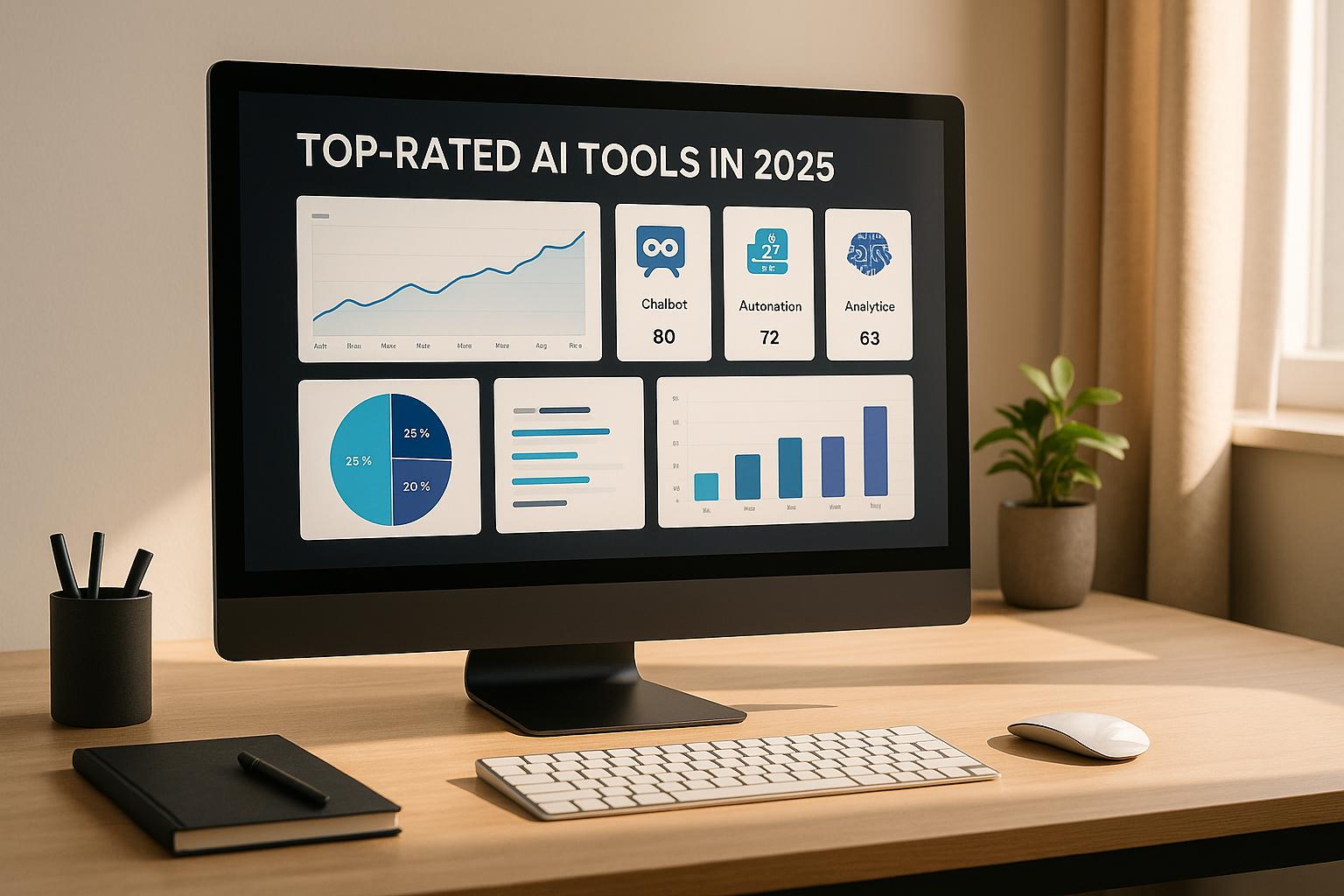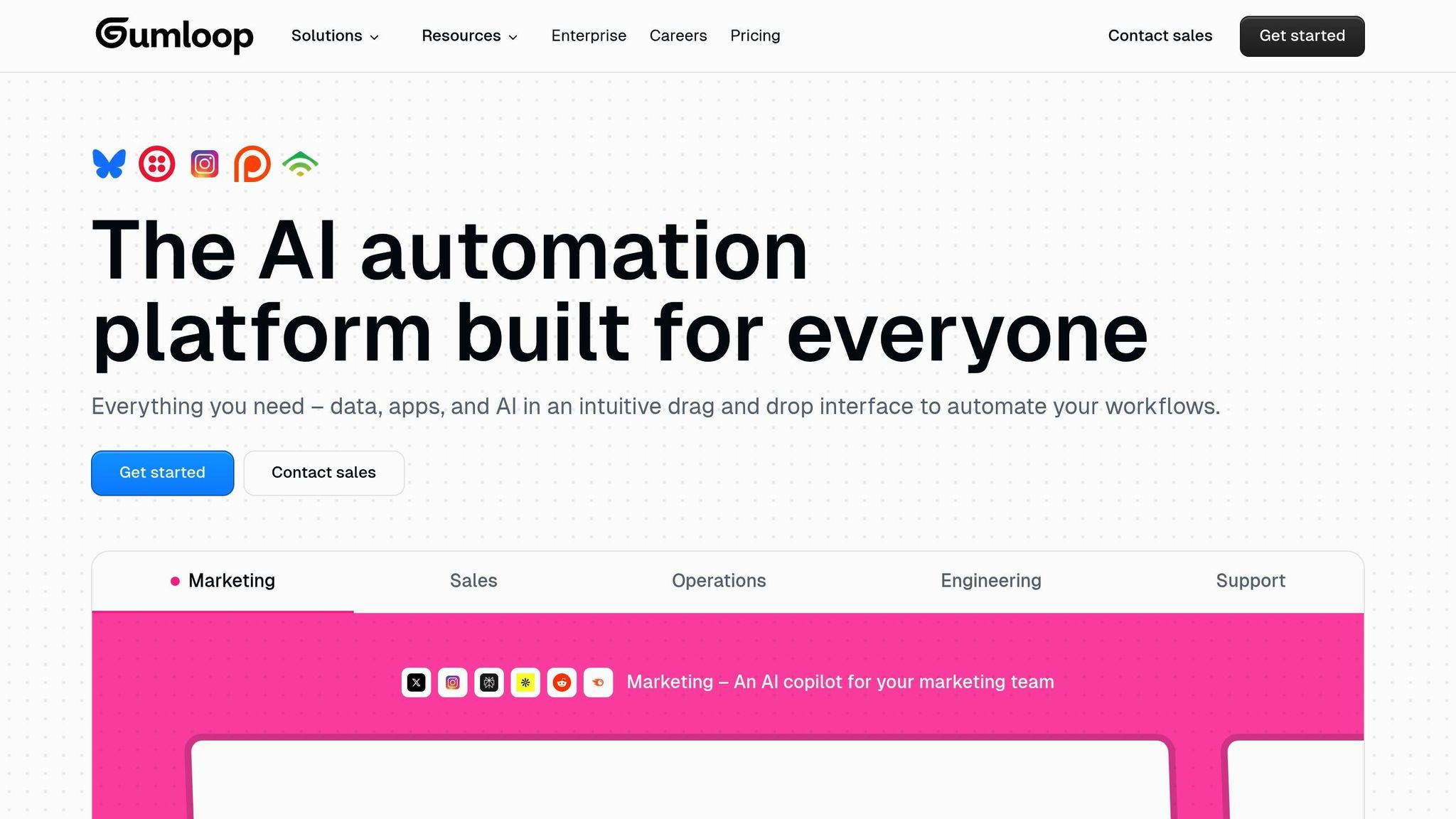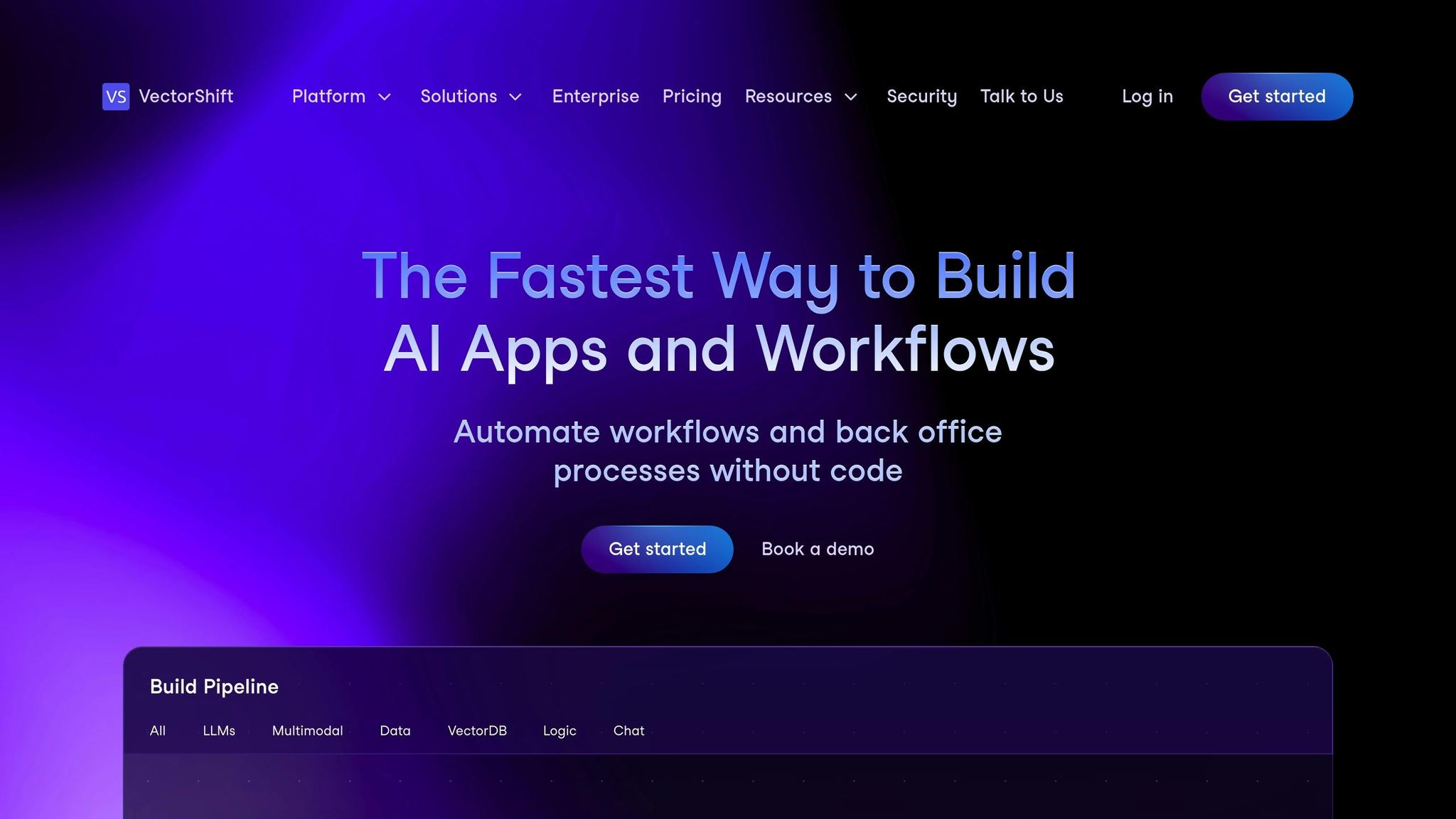
AI tools in 2025 are reshaping how businesses operate, offering unified platforms that simplify workflows, cut costs, and improve efficiency. The rise of interoperable systems allows access to multiple large language models (LLMs) like GPT-5 and Claude through a single interface - eliminating tool sprawl and enabling smarter decisions.
Here’s what you need to know:
Key takeaway: Unified platforms like Prompts.ai can reduce AI costs by up to 98% while boosting productivity 10×. Choose tools that prioritize integration, cost control, and strong governance to maximize ROI.

Prompts.ai is built to tackle the biggest challenges businesses face with AI in 2025: tool overload, hidden expenses, and governance gaps. Instead of juggling multiple AI subscriptions, this platform brings together access to over 35 leading large language models (LLMs) in one secure, streamlined interface.
This consolidated approach puts an end to the chaos caused by piecemeal AI adoption. Teams can tap into everything from creative models like Flux Pro to video generation tools like Kling, all while staying compliant with enterprise security standards.
Prompts.ai connects the dots across the AI landscape, offering access to 35+ top-tier models through a single platform. These models cover text generation, image creation, video production, and multimodal applications. By centralizing these tools, businesses no longer need to pay for multiple subscriptions, which can quickly become expensive and inefficient.
One standout feature is the side-by-side performance comparison. Teams can run the same prompt on multiple models simultaneously, making it easier to determine which one delivers the best results for specific tasks. This data-driven approach eliminates guesswork and helps organizations choose the right models for their workflows, rather than relying on vendor promises.
This integration also ensures cost transparency, empowering teams to make smarter financial decisions.
Prompts.ai simplifies AI spending with its integrated FinOps tools, which track token usage in real time. Costs are tied directly to outcomes using a pay-as-you-go TOKN credit system, eliminating the need for recurring subscription fees that often go underutilized. Businesses can see savings of up to 98% compared to managing multiple independent AI subscriptions.
Real-time tracking also highlights the most cost-efficient models, helping organizations optimize their budgets and avoid surprise expenses - a common issue with rapid AI adoption.
Prompts.ai prioritizes governance and security, ensuring every AI interaction is fully auditable. The platform keeps detailed logs of who used which models, when, and for what purpose, which is critical for meeting regulatory requirements and maintaining internal accountability.
Sensitive data stays under the organization’s control, with robust user management and permissions features. Administrators can decide which teams have access to specific models or functions, ensuring enterprise-grade security and compliance every step of the way.
Whether you’re a small creative team or a global enterprise, Prompts.ai is designed to grow with you. Adding new models, users, or teams takes just minutes, with no need for major infrastructure changes.
The platform’s scalability goes beyond user management. It can handle everything from occasional creative projects to high-volume automated workflows, adapting to your organization’s needs. Community contributions, such as the Prompt Engineer Certification program and shared "Time Savers" workflows, further accelerate deployment and help avoid common challenges in AI implementation.
This flexible, scalable approach ensures Prompts.ai keeps pace with modern demands, making it easier for organizations to align with evolving AI workflows.

Lindy simplifies intelligent workflow automation, making it accessible to everyone, regardless of technical expertise. By combining a conversational AI interface with automation capabilities, Lindy empowers business users to handle everyday tasks more efficiently.
What makes Lindy stand out is its reliance on natural language automation. Users can describe tasks in plain English, and the platform converts those instructions into actionable workflows. This eliminates the need to master complex programming or syntax. Additionally, Lindy integrates effortlessly with interoperable AI systems, ensuring a smooth user experience.
Lindy connects seamlessly with major CRM platforms, communication tools, and cloud services through a robust API. Using advanced language models, it processes natural language, analyzes data, and generates accurate responses. Secure authentication methods and pre-built workflow templates simplify the integration process, ensuring a smooth setup. These features also support clear and manageable cost tracking.
Lindy uses a usage-based pricing model, giving users control over their expenses. A real-time dashboard provides transparency by tracking automation costs as they occur, helping businesses assess the value and return on their automation investments.
For enterprises prioritizing security, Lindy ensures compliance through detailed action logs and role-based access controls. Sensitive automations are managed responsibly with secure data handling practices and built-in approval workflows, offering peace of mind for organizations handling critical tasks.
Lindy is available in both cloud and on-premises options, accommodating diverse data residency needs. The platform scales effortlessly from small teams to large enterprises, with auto-scaling infrastructure maintaining performance even during high-demand periods. Collaboration tools, such as version control and rollback options, make it easier for teams to manage complex automation projects. This adaptability ensures Lindy remains a key tool in unified AI workflow systems.

Gumloop simplifies workflow automation by connecting business tools with large language models (LLMs) through a user-friendly drag-and-drop interface - no coding required.
The platform focuses AI efforts on core reasoning tasks, transforming unstructured data like emails, documents, and social media into actionable insights.
"Gumloop has been critical in helping all teams at Instacart - including those without technical skills - adopt AI and automate their workflows, which has greatly improved our operational efficiency." - Fidji Simo, CEO, Instacart
With 110 native nodes, Gumloop offers one of the most extensive integration libraries available. It seamlessly connects with cutting-edge LLM AI models, enabling users to embed advanced language processing directly into their existing tools.
The platform’s drag-and-drop interface links CRMs, communication tools, data sources, and AI models effortlessly, making AI accessible to all teams. For instance, Shopify utilizes these integrations to efficiently manage complex data processing tasks.
This extensive connectivity is paired with strong security measures, ensuring both functionality and protection.
Gumloop’s integration capabilities are bolstered by rigorous governance controls and adherence to key industry standards. The platform provides detailed user permission settings and precise control over AI model usage, allowing organizations to comply with regulatory requirements while maintaining operational flexibility.
Data security is a cornerstone of Gumloop, featuring advanced encryption and real-time data wiping to protect sensitive information throughout the automation process. Additionally, the AI Proxy feature enables organizations to use their own API keys and route requests through their proxy systems for added security.
Gumloop scales effortlessly, accommodating small teams as well as enterprise-wide operations without driving up costs. By focusing AI efforts on core reasoning tasks, the platform ensures consistent performance, reliability, and cost efficiency as automation complexity grows.
Deployment options are equally flexible, addressing data residency requirements by allowing organizations to control where data is processed and stored. This flexibility supports compliance with regional regulations while enabling global teams to benefit from unified AI workflows.

Relevance AI presents a different take on creating intelligent workflows by leveraging AI to streamline operations. This platform connects diverse AI models and data sources through a user-friendly interface, making it easier to manage complex processes. However, specific details about its integration capabilities, pricing structure, scalability, or governance framework remain unclear. For a deeper understanding of its features and security protocols, it’s best to review the official documentation or reach out to Relevance AI directly.

VectorShift stands out as a lesser-known AI tool with limited public information available. Details about its integration features, pricing structure, and scalability remain unclear, as no verified data has been disclosed. To get accurate and up-to-date insights, it’s best to refer to the official documentation or reach out directly to their team.
While the available information is sparse, VectorShift shows potential and could be worth investigating further.
Global Relay's Relay delivers enterprise-level compliance solutions tailored for AI workflows, transforming regulatory practices from reactive to proactive. It addresses the increasing oversight demands of financial services and other tightly regulated industries.
Relay handles vast communication volumes in real time, identifying language issues, sentiment changes, and anomalies that may escape human review. This capability is crucial for achieving scalable and reliable compliance.
Relay seamlessly integrates with open-source large language models (LLMs), backed by thorough documentation and rigorous testing. This transparency ensures clients have the data needed to address regulatory inquiries with confidence.
The system’s architecture captures data comprehensively across multiple communication channels, including ephemeral messages that often present compliance challenges. By consolidating these functions under a single-vendor solution, Relay eliminates the risks associated with fourth-party vendors. All communications data is captured, monitored, and securely stored in Global Relay’s own data centers.
Relay is built on a strong governance framework that incorporates strict protocols, complete data mapping, and frequent model retraining to counter AI drift. Its hub-and-spoke data management system, combined with machine learning-driven monitoring, quickly identifies emerging risks, flags suspicious communications, and detects conflicts with precision.
One standout feature is real-time compliance monitoring, which alerts teams to potential violations as they happen. This enables swift action to prevent regulatory breaches. Additionally, the system automates audit preparation, compiling documentation, creating thorough audit trails, and generating detailed reports to meet regulatory requirements efficiently.
Relay’s adaptive learning capabilities enhance accuracy as data volumes grow, ensuring it scales effectively with organizational needs. Its ability to analyze multiple communication channels, combined with deployment through Global Relay’s secure data centers, provides a controlled and compliant environment that meets stringent regulatory standards.
With its robust compliance framework and seamless integration capabilities, Relay is a critical tool for simplifying and optimizing AI workflows.
When selecting AI tools for enterprise use, it's essential to understand how each platform measures up in terms of capabilities. The table below compares key features like supported models, automation tools, governance options, pricing structures, and scalability. This breakdown helps highlight the strengths of each solution.
| Tool | Supported LLMs | Automation Features | Governance Options | Pricing (USD) | Scaling Capabilities |
|---|---|---|---|---|---|
| Prompts.ai | 35+ models including GPT-4, Claude, LLaMA, and Gemini | Side-by-side model comparison, unified workflow orchestration, real-time FinOps cost controls | Enterprise-grade security, audit trails, compliance frameworks, data governance | Pay-as-you-go TOKN credits; Business plans: $99–$129/member/month | Multi-tenant architecture enabling rapid team scaling |
| Relevance AI | Embeddings and RAG-enabled LLMs | CRM triggers, dataset parsing, report generation, campaign optimization, customer journey analysis, content operations | Brand and compliance alignment controls | Custom pricing | Agent platform architecture tailored for marketing and analytics scale |
Prompts.ai stands out with its pay-as-you-go TOKN credit system, which directly ties costs to actual usage, potentially reducing expenses by as much as 98%. As Johannes V., a Freelance AI Director, shared:
"Iteration via @prompts.ai a great tool that allows you to iterate via multiple models at the same time and compare renderings immediately."
On the other hand, Relevance AI focuses on marketing and analytics automation, offering tools like campaign optimization and customer journey analysis through an intuitive visual workflow design.
Both platforms reflect a growing trend toward AI solutions that streamline workflows and provide enterprise-ready automation, making them powerful options for businesses looking to enhance efficiency and scalability.
Selecting the right AI workflow platform means weighing initial costs against long-term benefits. While implementing AI automation can require a higher upfront investment, organizations that adopt these systems strategically often experience a 40% productivity increase and see profits grow by up to 95%.
Businesses leveraging AI for workflow automation also report a 31% reduction in operational costs, with 92% of leaders prioritizing AI-driven solutions to improve efficiency. With global spending on AI automation expected to surpass $630 billion by 2028, the real question isn’t whether to adopt AI, but which platform will deliver the best return on your investment.
Integration capabilities should top your list of priorities. Choose platforms that support multiple large language models and integrate seamlessly with your existing tools. This flexibility helps avoid vendor lock-in while ensuring your system can adapt as new models and technologies emerge. Platforms that connect diverse tools and models enhance efficiency and scalability as your business evolves.
Cost control is another critical factor. Traditional subscription models often lead to budget overruns as usage grows. Instead, opt for pay-as-you-go pricing, which ties expenses directly to usage, offering better cost management. However, this cost-efficiency must pair with strong compliance measures to ensure enterprise-grade security.
Compliance and governance features are non-negotiable for enterprise-level deployments. Detailed audit trails, robust data governance, and top-tier security frameworks may seem cumbersome initially but are essential in preventing costly breaches. Additionally, your platform must be scalable to meet future demands.
Scalability is key to long-term success. While manual workflows may appear cheaper upfront, they often result in higher costs over time due to labor demands, human error, and ongoing training needs. Advanced AI features - like machine learning, natural language processing, and predictive analytics - can handle complex, dynamic tasks that would otherwise require significant human intervention.
The best implementations focus on measurable outcomes rather than flashy features. For instance, content generation tools can cut production times by up to 90%, while predictive maintenance programs, such as General Electric’s Digital Wind Farm, save millions in operational costs. Similarly, Siemens achieved a 40% reduction in administrative tasks, lowering costs by 30% through automation.
Define your specific use cases and the ROI you expect. The ideal AI workflow platform should reduce tool sprawl, provide clear cost tracking, and grow alongside your organization. Remember, the cheapest upfront option can often lead to higher long-term costs due to hidden fees, integration issues, or scalability challenges. Ultimately, a platform that balances integration, cost efficiency, compliance, and scalability is essential for achieving sustainable AI workflow success.
Prompts.ai enables businesses to cut costs by automating repetitive tasks, minimizing reliance on manual labor, and streamlining workflows. These efficiencies translate into noticeable savings and smoother operations.
Beyond cost reduction, it boosts productivity by speeding up data analysis, aiding smarter decision-making, and integrating effortlessly with existing systems. By taking the complexity out of processes, Prompts.ai allows teams to concentrate on high-priority tasks, delivering stronger outcomes and fostering sustainable growth.
When selecting an AI tool for automating workflows, it's important to prioritize integration capabilities to ensure smooth compatibility with your current systems. Choose a solution that can adapt to your business's growth and includes strong security measures to safeguard sensitive information.
User-friendliness should also be a key consideration. Opt for tools with intuitive interfaces and customization features that allow you to adapt them to your specific processes. Evaluate the accuracy and speed of the AI, along with the vendor's track record and customer support. These elements are crucial for finding a dependable and efficient tool that meets your business needs.
Prompts.ai places a strong emphasis on security and compliance, employing advanced encryption methods to protect sensitive information throughout every AI interaction. The platform ensures uniform security measures across workflows, providing security teams with real-time monitoring and the ability to detect potential threats swiftly.
To encourage responsible AI practices, Prompts.ai offers tools for designing and managing acceptable use policies. These features help businesses align their AI operations with industry regulations and mitigate risks of misuse, delivering confidence to organizations integrating advanced AI capabilities.


